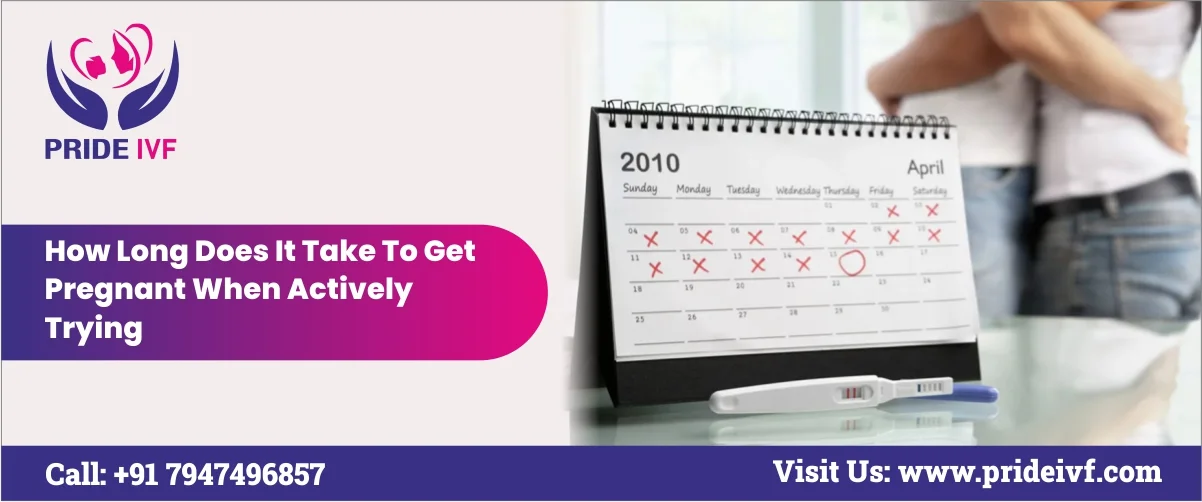It may appear to be an uncommon or awkward issue to address, but how many months should you wait before seeking professional help for infertility concerns? This is not a widely recognized approach, as infertility is rarely discussed openly among family and friends. Let this be the first thing you learn: you are not alone if pregnancy does not happen as quickly as planned.
A typical question couples have is, How long does it take to get pregnant when actively trying? While some couples conceive quickly, others may find that the process takes longer. Understanding the factors that influence conception can aid in managing expectations and deciding when to seek medical advice.




Overview
Bringing a kid into the world is usually a tremendous decision, fraught with fear and excitement. The next question for couples is, How soon will we conceive? Some are blessed with almost immediate pregnancies, while others wonder how long does it take to get pregnant when actively trying. This blog delves into the intricacies of what one can anticipate, the optimal time to consider seeking assistance, and the myriad factors that influence the duration it takes to actualize conception. Consider it a big step towards achieving your parental aspirations.
Childbearing and parenthood are highly sought adult occupations, yet they may not always happen as expected. Fertility issues affect roughly 73 million couples worldwide, making it difficult to achieve their desired outcome.
How Long Does It Take To Get Pregnant When Actively Trying: Factors Influencing Conception
-
Age
For women, their age plays a significant role in determining their fertility. Generally, the chances of conception are higher for women in their 20s and early 30s every month as fertility naturally declines with age. The rate at which fertility diminishes accelerates after the age of 35 (how to boost your fertility in your 30s); when a woman reaches 40 years old, it decreases down to about 5% per cycle signifying a drastic drop in the likelihood of getting pregnant without intervention.
For men, male infertility does increase with age though men remain fertile for longer periods than women. The decrease in sperm motility and morphology might affect the odds of fertilization, which means that even if guys can procreate later in life, their sperm quality suffers.
-
The frequency of sexual intercourse
Having regular unprotected sex within a woman’s reproductive window enhances her chances of becoming pregnant. The fertile window refers to the five days preceding ovulation besides the day of ovulation.
-
Lifestyle and Routine Factors
Smoking, binge drinking, obesity, and a lack of physical activity hurt fertility in both men and women. On the other side, correct diet consumption, regular exercise, abstaining from drugs, and maintaining a healthy weight can all help with fertility. Some illnesses that might influence fertility include endometriosis, thyroid disorders, and polycystic ovarian syndrome.
-
Ovulation and Timing
Detecting ovulation can significantly increase the odds of conceiving. A woman usually ovulates between ten and fourteen days before her next menstrual period begins. Fertile days can be easily identified using ovulation predictor kits, basal body temperature charting, and cervical mucus tracking.
Lets get started
What should you do to get pregnant soon?
You must live healthy to become a mother. For example, having sex around the time of ovulation (when a woman’s egg is released from her body) may increase your chances of becoming pregnant. During ovulation testing, luteinizing hormone levels rise and peak about 24-36 hours before ovulation. When you are planning for a baby, make sure you use an ovulation test which will help you track your menstrual cycle and identify any changes in the length of the periods as soon as possible. An ovulation test kit can tell whether or not you are having intercourse at the right moment when trying to boost your chance of pregnancy; however, it does not take away your worries.
When to Seek Help
Both partners should undergo a fertility evaluation to identify any potential issues. Standard exams typically include:
For Women
- Tracking the release of an egg
- Testing for hormones
- Pelvic ultrasound
- Hysterosalpingography (HSG)
For males
- Evaluation of sperm motility through semen analysis.
- Study of the structure and form of words
- Sperms Count
Improve Your Food Intake
What you consume matters. If you’re wondering how to increase your chances of conception, try to include the following foods in your normal diet:
- Foods high in iron, such as broccoli and other green leafy vegetables
- Grapefruits, oranges, and other citrus fruits can boost Vitamin C levels. (Ensure that citrus does not conflict with any medications.)
- Dairy products can enhance vitamins A, E, D, and K to decrease ovulation complications.
- Fresh, preservative-free fruits and veggies.
- Consume beans and lentils to enhance your folate and fiber intake.
- Asparagus and oysters include crucial elements that boost fertility.
- Pomegranate – to boost male fertility.
Maintaining a Positive Mindset
Ensure you prioritize your mental and emotional well-being as much as your physical fertility. Here are some tips on how to maintain a positive perspective:
- Educate Yourself: Understanding the mechanisms of fertility could assist in feeling empowered and reducing anxiety levels. Gaining information helps manage expectations and prepares you for potential challenges.
- Methods for Relaxation and Mindfulness: Yoga, meditation, and deep breathing can help maintain emotional balance and handle stress.
- Look for help: If you need professional support, don’t hesitate. Support groups and fertility counselors can provide beneficial knowledge and a sense of belonging. Communicate openly with your partner and seek help from friends, relatives, or support groups to navigate this process together.
Conclusion
The pregnancy journey for every couple varies and so does their process. While some people conceive almost immediately after starting to try, others may take a longer time. To increase your chances of getting pregnant, learn about factors affecting fertility, stick to a healthy lifestyle, seek professional help if necessary, and know when conception takes place.
There is no standard response to the question of how long does it take to get pregnant when actively trying. It varies between couples. Tracking your ovulation, taking care following ovulation when attempting to conceive, and living a healthy lifestyle can all help boost your chances of becoming pregnant. If nothing works, seeking medical attention is best rather than giving up.




